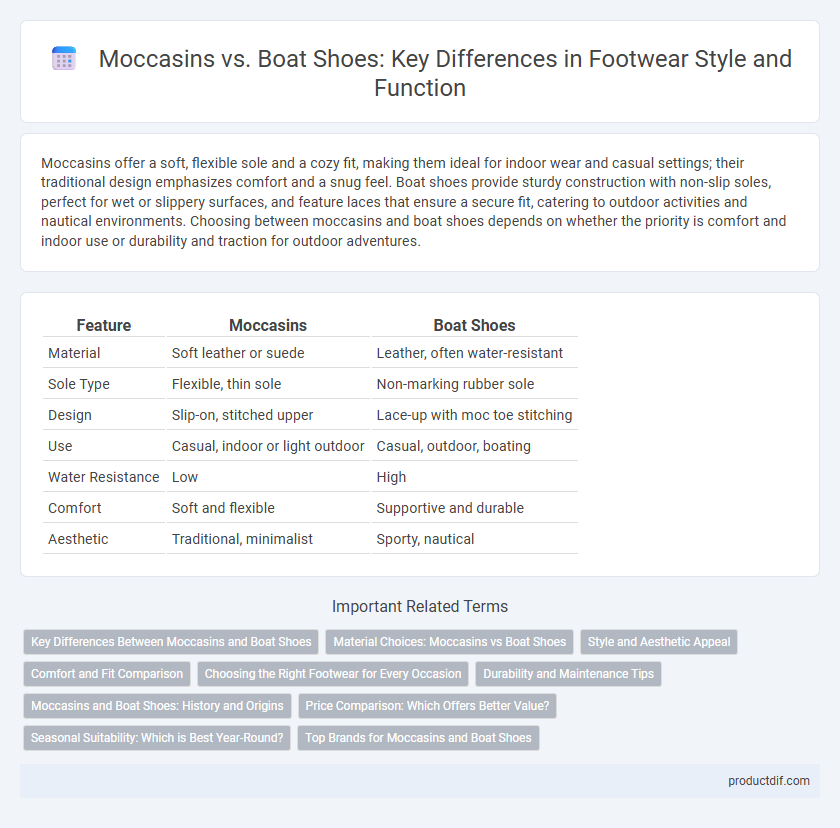Moccasins offer a soft, flexible sole and a cozy fit, making them ideal for indoor wear and casual settings; their traditional design emphasizes comfort and a snug feel. Boat shoes provide sturdy construction with non-slip soles, perfect for wet or slippery surfaces, and feature laces that ensure a secure fit, catering to outdoor activities and nautical environments. Choosing between moccasins and boat shoes depends on whether the priority is comfort and indoor use or durability and traction for outdoor adventures.
Table of Comparison
| Feature | Moccasins | Boat Shoes |
|---|---|---|
| Material | Soft leather or suede | Leather, often water-resistant |
| Sole Type | Flexible, thin sole | Non-marking rubber sole |
| Design | Slip-on, stitched upper | Lace-up with moc toe stitching |
| Use | Casual, indoor or light outdoor | Casual, outdoor, boating |
| Water Resistance | Low | High |
| Comfort | Soft and flexible | Supportive and durable |
| Aesthetic | Traditional, minimalist | Sporty, nautical |
Key Differences Between Moccasins and Boat Shoes
Moccasins feature a soft sole made of leather or suede, providing flexibility and comfort ideal for indoor or casual wear, whereas boat shoes incorporate rubber soles with non-marking tread designed for traction on wet surfaces. Moccasins often have minimal construction with a stitched upper and lack lacing systems, contrasting with boat shoes which include laces and eyelets for a secure fit. The materials used also differ: moccasins typically use supple materials enhancing breathability, while boat shoes employ waterproof leather or treated canvas to resist moisture.
Material Choices: Moccasins vs Boat Shoes
Moccasins traditionally feature soft, supple leather such as deerskin or suede, providing flexibility and breathability ideal for indoor and casual wear. Boat shoes typically use sturdy, water-resistant leather or treated canvas to withstand wet conditions, combined with non-marking rubber soles for traction on slippery surfaces. Material choice impacts durability, comfort, and suitability for different environments, with moccasins favoring comfort and boat shoes emphasizing performance and weather resistance.
Style and Aesthetic Appeal
Moccasins offer a timeless, handcrafted look with soft leather and intricate stitching, appealing to those who favor a classic, relaxed style. Boat shoes feature a more structured design with durable leather and contrasting laces, often complemented by non-slip soles, ideal for a nautical-inspired, casual yet polished appearance. Both footwear options enhance versatility but cater to different fashion sensibilities, with moccasins leaning toward a cozy, artisanal vibe and boat shoes emphasizing functional elegance.
Comfort and Fit Comparison
Moccasins offer a soft, flexible fit due to their supple leather construction and minimal sole structure, providing a barefoot-like comfort ideal for casual wear. Boat shoes feature a more structured fit with durable rubber soles and built-in arch support, enhancing stability and comfort during extended use on slippery surfaces. Both styles excel in comfort but cater to different foot support needs and activity types.
Choosing the Right Footwear for Every Occasion
Moccasins offer exceptional comfort and a casual, laid-back style ideal for indoor wear and relaxed outdoor settings, while boat shoes provide durable, slip-resistant soles perfect for wet or nautical environments. Choosing the right footwear depends on activity and setting, with moccasins favored for softness and flexibility, and boat shoes preferred for traction and water resistance. Prioritize moccasins for daily casual use and boat shoes when expecting damp conditions or needing reliable grip on slippery surfaces.
Durability and Maintenance Tips
Moccasins, crafted from soft leather or suede, offer moderate durability but require frequent conditioning to prevent cracking and maintain suppleness. Boat shoes feature sturdier construction with water-resistant materials and non-slip rubber soles, making them more durable for wet conditions and easier to clean with mild soap and water. Proper care for moccasins includes regular use of leather conditioners and avoiding moisture exposure, while boat shoes benefit from quick drying and occasional sole inspection to extend lifespan.
Moccasins and Boat Shoes: History and Origins
Moccasins trace their origins to Indigenous peoples of North America, crafted for durability and comfort using soft leather and flexible soles ideal for forest terrain. Boat shoes, developed in the early 20th century for sailors, feature non-marking rubber soles with siping to provide grip on wet decks, combining function with casual style. Both footwear types reflect cultural heritage and purpose-driven design, influencing contemporary casual and outdoor fashion trends.
Price Comparison: Which Offers Better Value?
Moccasins generally cost between $50 and $150, offering a blend of comfort and style suitable for casual wear, while boat shoes typically range from $80 to $200, favored for their durability and water resistance. When evaluating value, moccasins provide affordability with soft leather and versatility, making them ideal for indoor and light outdoor use. Boat shoes, though pricier, deliver enhanced functionality with non-slip soles and weather-resistant materials, making them a better long-term investment for active, outdoor environments.
Seasonal Suitability: Which is Best Year-Round?
Moccasins, crafted from soft leather or suede, offer breathable comfort and warmth ideal for fall and mild winter months, providing a cozy fit but less water resistance. Boat shoes feature non-slip rubber soles and water-resistant treatments, making them perfect for spring and summer waterside activities but less suitable in cold, wet conditions. For year-round use, moccasins excel in dry, cooler climates while boat shoes dominate warm, humid environments with exposure to moisture.
Top Brands for Moccasins and Boat Shoes
Top brands for moccasins include Minnetonka, known for traditional handcrafted leather designs, and Tod's, which offers luxury suede options with signature rubber pebble soles. For boat shoes, Sperry is a market leader recognized for durable, water-resistant materials and classic non-slip soles, while Sebago provides premium craftsmanship favored in nautical and casual wear. Both categories emphasize comfort and style, with brand reputations built on quality leather and long-lasting performance.
Moccasins vs boat shoes Infographic

 productdif.com
productdif.com